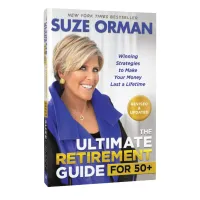Suze Orman Tells Us the Biggest Retirement Mistake You Can Make
The best-selling author and podcaster also tells Kiplinger in an interview her runner-up all-time retirement snafu.


Profit and prosper with the best of Kiplinger's advice on investing, taxes, retirement, personal finance and much more. Delivered daily. Enter your email in the box and click Sign Me Up.
You are now subscribed
Your newsletter sign-up was successful
Want to add more newsletters?

Delivered daily
Kiplinger Today
Profit and prosper with the best of Kiplinger's advice on investing, taxes, retirement, personal finance and much more delivered daily. Smart money moves start here.

Sent five days a week
Kiplinger A Step Ahead
Get practical help to make better financial decisions in your everyday life, from spending to savings on top deals.

Delivered daily
Kiplinger Closing Bell
Get today's biggest financial and investing headlines delivered to your inbox every day the U.S. stock market is open.

Sent twice a week
Kiplinger Adviser Intel
Financial pros across the country share best practices and fresh tactics to preserve and grow your wealth.

Delivered weekly
Kiplinger Tax Tips
Trim your federal and state tax bills with practical tax-planning and tax-cutting strategies.

Sent twice a week
Kiplinger Retirement Tips
Your twice-a-week guide to planning and enjoying a financially secure and richly rewarding retirement

Sent bimonthly.
Kiplinger Adviser Angle
Insights for advisers, wealth managers and other financial professionals.

Sent twice a week
Kiplinger Investing Weekly
Your twice-a-week roundup of promising stocks, funds, companies and industries you should consider, ones you should avoid, and why.

Sent weekly for six weeks
Kiplinger Invest for Retirement
Your step-by-step six-part series on how to invest for retirement, from devising a successful strategy to exactly which investments to choose.
Editor's note: This article is part of an ongoing series in which we ask influential personal finance figures to share their opinion on the biggest retirement mistake you can make. Other articles feature Dave Ramsey and Grant Cardone.
Suze Orman, The New York Times best-selling author of "The Ultimate Retirement Guide for 50+," podcaster, finance guru and motivational speaker, has seen it all when it comes to retirement mistakes.
In her nearly 40 years as a financial adviser, people have come to her when they’ve spent too much money, paid too much in taxes or made hasty decisions that lost them too much money.
The biggest mistake, the one that Orman sees all the time, the one that people lose thousands of dollars over, is claiming Social Security early.
What constitutes early for Orman? Claiming anytime before at least your full retirement age, which is 67 for anyone born in 1960 or after.
“Everybody thinks Social Security isn’t going to be there. Everybody is scared to death, but I wouldn’t be,” says Orman. By claiming early, “you’re passing up an 8% increase each year in your Social Security from your full retirement age all the way to 70.”
You might not think delaying filing for Social Security makes that big a difference in terms of your benefit amount, but it could add up to a lot more money than you realize.
The maximum a 62-year-old can receive monthly in 2025 is $2,831. If that person waits until they turn age 66/67 to file for benefits, their monthly check increases to $4,018. If they hold off until age 70, their check increases to $5,108.
From just $107.88 $24.99 for Kiplinger Personal Finance
Become a smarter, better informed investor. Subscribe from just $107.88 $24.99, plus get up to 4 Special Issues

Sign up for Kiplinger’s Free Newsletters
Profit and prosper with the best of expert advice on investing, taxes, retirement, personal finance and more - straight to your e-mail.
Profit and prosper with the best of expert advice - straight to your e-mail.
Don’t let fear cost you money
Many people collect Social Security early out of fear it won’t be around for much longer, but Orman doesn’t think that's a viable reason to claim benefits. While it's true that the Old-Age and Survivors Insurance Trust Fund, which pays Social Security retiree benefits, is projected to become insolvent in the first quarter of 2033, that doesn’t mean it'll collapse. If nothing is done by then, benefits would face a 23% cut, and beneficiaries would then receive 77% of their benefits.
If you have a serious illness or need the money to get by, you might have to collect Social Security early. But otherwise, collecting Social Security before you've at least reached your full retirement age can backfire, leaving you short on cash over your lifetime. Retirement can last 20 years or more for many people.
“They find out it's a lot more expensive in retirement than they thought,” says Orman.
They're spending the same, if not more, and they're dealing with inflation. At the same time, they're withdrawing from their retirement accounts and depleting their savings.
Their Social Security payment is already locked in at a lower rate, and it's not enough. As a result, they're now either forced to change their lifestyles or return to work, she says.
The better option, says Orman, is to wait to file for benefits.
“Where else are you going to make that money? You're not,” says Orman. “Claiming Social Security before full retirement age is one of the biggest mistakes you could possibly make."

Suze Orman has been advising people about finances for decades.
Second place: Ignoring the Roth option
In wanting to be generous with Orman’s advice, we're also sharing her second-place all-time mistake — and this one is geared toward pre-retirees.
Ignoring the Roth conversion
“You don’t want to be partners with Uncle Sam,” says Orman. “A big mistake everybody is making leading up to retirement is not taking advantage of the Roth 401(k), 403(b) or Roth IRA.”
Pre-retirees and retirees like traditional 401(k)s, funded by pre-tax dollars, because they get a tax break now while they're still working and potentially are in a higher tax bracket than when they retire. They figure their income tax bracket will be lower when they're retired and start withdrawing from their retirement accounts.
What some people don’t take into account are required minimum distributions or RMDs, says Orman. RMDs kick in when you turn 73 and require you to withdraw a percentage of your 401(k) or IRA each year. The withdrawal is treated as ordinary income, which can be a big tax hit if the RMD is large enough.
“The money in your retirement account is compounding and growing, and it's growing ... for you and Uncle Sam,” says Orman. “Why do you think Uncle Sam is allowing you that long (before RMDs)? Because the more time it's in there, the larger it grows, the more they are going to get in income taxes.”
Get the new 2025 edition of Suze's Ultimate Retirement Guide for $10 and free shipping.
Don’t forget your heirs
From an estate planning standpoint, it's also a mistake to ignore a Roth conversion, says Orman.
That's because non-spousal beneficiaries of an inherited 401(k) or IRA must withdraw all funds from the account and pay the taxes within 10 years.
“If you give up that tax write-off today, the money you leave your kids gets to grow tax-free, and they don’t have RMDs later on in life,” says Orman.
Remember, a Roth conversion is a taxable event; You should contact a financial adviser and/or a tax professional before making any moves. If you retire and are in a high tax bracket, another option may be the better choice.
“I don’t care how old you are, if you’ve gone back to work and are making $20,000 or $30,000, if your employer offers it, get it,” says Orman. “A big mistake you’ll make is not taking advantage of the Roth IRA.”
Live and learn with Orman

From saving to estate planning, Orman has seen it all when it comes to retirement mistakes.
Other mistakes Orman has seen over her illustrious career include:
- Living above your means: “You have to live below your means and within your needs.”
- Buying a life insurance annuity: “People go to these retirement seminars, get a free dinner and end up walking away with a life insurance annuity product. It's a huge mistake that so many of you make.”
- Not having a revocable living trust: “Everybody thinks in terms of death. Death is easy. What is not easy is an incapacity. I see it all the time.”
- Assuming you’ll always have an income: “Everyone thinks I don’t have to save today, I’ll always have an income coming in, until they don't.”
Nobody’s retirement is perfect. There are many bumps along the way, and mistakes are bound to happen.
But hopefully, this bit of advice from Orman can make the journey a little smoother.
Related content
Profit and prosper with the best of Kiplinger's advice on investing, taxes, retirement, personal finance and much more. Delivered daily. Enter your email in the box and click Sign Me Up.

Donna Fuscaldo is the retirement writer at Kiplinger.com. A writer and editor focused on retirement savings, planning, travel and lifestyle, Donna brings over two decades of experience working with publications including AARP, The Wall Street Journal, Forbes, Investopedia and HerMoney.
-
 Quiz: Do You Know How to Avoid the "Medigap Trap?"
Quiz: Do You Know How to Avoid the "Medigap Trap?"Quiz Test your basic knowledge of the "Medigap Trap" in our quick quiz.
-
 5 Top Tax-Efficient Mutual Funds for Smarter Investing
5 Top Tax-Efficient Mutual Funds for Smarter InvestingMutual funds are many things, but "tax-friendly" usually isn't one of them. These are the exceptions.
-
 AI Sparks Existential Crisis for Software Stocks
AI Sparks Existential Crisis for Software StocksThe Kiplinger Letter Fears that SaaS subscription software could be rendered obsolete by artificial intelligence make investors jittery.
-
 Quiz: Do You Know How to Avoid the 'Medigap Trap?'
Quiz: Do You Know How to Avoid the 'Medigap Trap?'Quiz Test your basic knowledge of the "Medigap Trap" in our quick quiz.
-
 We Retired at 62 With $6.1 Million. My Wife Wants to Make Large Donations, but I Want to Travel and Buy a Lake House.
We Retired at 62 With $6.1 Million. My Wife Wants to Make Large Donations, but I Want to Travel and Buy a Lake House.We are 62 and finally retired after decades of hard work. I see the lakehouse as an investment in our happiness.
-
 Social Security Break-Even Math Is Helpful, But Don't Let It Dictate When You'll File
Social Security Break-Even Math Is Helpful, But Don't Let It Dictate When You'll FileYour Social Security break-even age tells you how long you'd need to live for delaying to pay off, but shouldn't be the sole basis for deciding when to claim.
-
 I'm a Wealth Adviser Obsessed With Mahjong: Here Are 8 Ways It Can Teach Us How to Manage Our Money
I'm a Wealth Adviser Obsessed With Mahjong: Here Are 8 Ways It Can Teach Us How to Manage Our MoneyThis increasingly popular Chinese game can teach us not only how to help manage our money but also how important it is to connect with other people.
-
 Global Uncertainty Has Investors Running Scared: This Is How Advisers Can Reassure Them
Global Uncertainty Has Investors Running Scared: This Is How Advisers Can Reassure ThemHow can advisers reassure clients nervous about their plans in an increasingly complex and rapidly changing world? This conversational framework provides the key.
-
 5 Ronald Reagan Quotes Retirees Should Live By
5 Ronald Reagan Quotes Retirees Should Live ByThe Nation's 40th President's wit and wisdom can help retirees navigate their financial and personal journey with confidence.
-
 We're 78 and Want to Use Our 2026 RMD to Treat Our Kids and Grandkids to a Vacation. How Should We Approach This?
We're 78 and Want to Use Our 2026 RMD to Treat Our Kids and Grandkids to a Vacation. How Should We Approach This?An extended family vacation can be a fun and bonding experience if planned well. Here are tips from travel experts.
-
 Should You Jump on the Roth Conversion Bandwagon? A Financial Adviser Weighs In
Should You Jump on the Roth Conversion Bandwagon? A Financial Adviser Weighs InRoth conversions are all the rage, but what works well for one household can cause financial strain for another. This is what you should consider before moving ahead.
